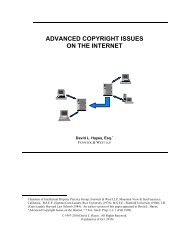International Tax Aspects of Foreign Currency Transactions
International Tax Aspects of Foreign Currency Transactions
International Tax Aspects of Foreign Currency Transactions
You also want an ePaper? Increase the reach of your titles
YUMPU automatically turns print PDFs into web optimized ePapers that Google loves.
The obligor <strong>of</strong> a non-functional currency loan payable recognizes§ 988 gain or loss on the satisfaction <strong>of</strong> the loan with stock. Theissue price <strong>of</strong> the debt is then adjusted before calculating any § 108/ COD consequences <strong>of</strong> the capitalization. See id., Example 2.(e)Special Timing Rules for Non-Functional <strong>Currency</strong> DebtInstruments.Change to debt’s denomination currency. Prop. Reg. § 1.988-2(b)(14)(i) (1992) would authorize the IRS to defer foreigncurrency gain or loss that would otherwise be recognized on adebt-for-debt exchange if the IRS determines that “the new debthas in effect been replaced with other debt denominated in adifferent currency.” This rule predates § 1.1001-3, and it is unclearhow the two rules interact.§ 267(f).Generally, a sale or exchange giving rise to a currency loss,including a payment or deemed disposition <strong>of</strong> a note, will besubject to deferral Section 267(f). The deferred loss is taken intoaccount under Reg. § 1.1502-13 matching / acceleration ruleprinciples.Section 267(f)(3)(c) and Reg. § 1.267(f)-1(e) provide an exceptionto loss deferral for losses recognized by the lender on certainintercompany loans made in a non-functional currency.Specifically, the exception applies to non-functional currency debtinstruments, not issued in a hyperinflationary currency, where “thetransaction does not have as a significant purpose the avoidance <strong>of</strong>Federal income tax.” Although nothing definitive is on point, “thetransaction” has been read to refer to entering into the loan (orperhaps modifying its terms), rather than the sale or exchangetriggering the loss. See FSA #003184.It is unclear how to apply the matching rule or acceleration rule fora loss recognized on a foreign currency transaction. For example,if the currency used to repay the loan is disposed <strong>of</strong> by the lenderoutside <strong>of</strong> the group, does this trigger the acceleration rule?For an interesting application <strong>of</strong> the § 267(f) matching rule in thecontext <strong>of</strong> hedging, see PLR 200945026. There, the IRS addressedthis issue in the context <strong>of</strong> hedging contracts between USConsolidated Group and <strong>Foreign</strong> Affiliates (under a foreignparent). Based on a number <strong>of</strong> representations as to the businessmotivated nature <strong>of</strong> the hedging, the IRS ruled that losses on16© 2013 William R. Skinner, Esq.Fenwick & West LLPwrskinner@fenwick.com
















